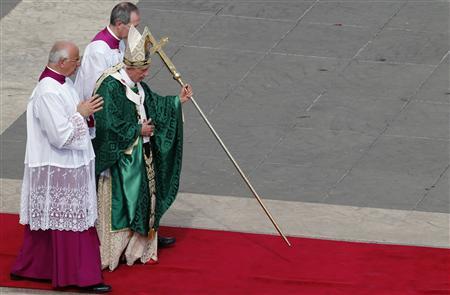Pope Warns Lapsed Catholics of "Spiritual Desertification"
By Philip Pullella
Pope Benedict urged lapsed and lukewarm Roman Catholics on Thursday to rediscover their Church and stop the advance of "spiritual desertification". The pope made his comments in the homily of a Mass before tens of thousands in St Peter's Square on the 50th anniversary of the opening of the Second Vatican Council, a far-reaching event in the Church's 2,000-year history. "Recent decades have seen the advance of a spiritual desertification," he said, opening a worldwide "Year of Faith". "We see it all around us ... the void has spread." The mass was attended by hundreds of Roman Catholic bishops as well as representatives of other Christian churches, such as Archbishop of Canterbury Rowan Williams. The bishops are in Rome for a synod, or conference, at the Vatican aimed at building a strategy to bring lapsed Catholics back to the faith. The Vatican has termed this effort the "new evangelization" of the developed world and it has asked Catholics, particularly those who have left the Church, to look deep into their hearts and either rekindle their relationship with God or deepen it. Local Catholic parishes around the world will hold events such as Bible studies, retreats, special Masses, community service events and discussion groups about the sacraments. The pope urged Catholics to use these opportunities to rediscover "the thirst for God, the ultimate meaning of life". The Church is suffering desertions from its practicing flock in former strongholds in Europe, North America and Latin America due to sex abuse scandals, increasing secularism, rival faiths and open dissent against Church teachings on homosexuality and its ban on a female priesthood. "NEW EVANGELISATION" The synod's working document speaks of the need to address the divergence between Catholic values and the reality of modern life in Europe and North America, and an "educational emergency" of children no longer being taught the faith. Pope John XXIII convened the Second Vatican Council 50 years ago to bring the Church up to date with the modern world. During the Council, which ended in 1965, nearly 3,000 bishops from more than 100 countries wrote 16 documents on various aspects of Church life and mission and urged more "collegiality," or sharing of responsibility, between the pope and bishops. Among its innovations was the introduction of the Mass in local languages after centuries of it being said in Latin. The Council also encouraged dialogue with, and respect for, other religions and repudiated the concept of collective Jewish guilt for Jesus' death, revolutionizing Catholic-Jewish relations after 2,000 years of mistrust. But 50 years on, the Council is divisive. Liberals in the Church say Benedict, who attended the Council as a young priest, has turned back the clock on some Council reforms and moved to centralize power in the Vatican again. Conservatives praise him for correcting what they regard as errors in applying its ideas. For example, conservatives assert that the Council's push for dialogue with other religions went too far and weakened the traditional teaching that Catholicism is the one true faith.
|
.
Any original material on these pages is copyright © BishopAccountability.org 2004. Reproduce freely with attribution.
